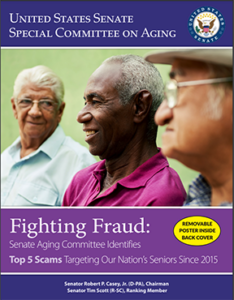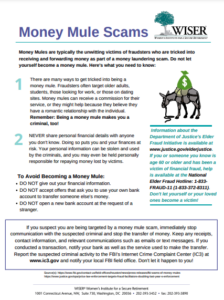
Jump to:
 NEW: The Senate Special Committee on Aging released the Fraud Book to arm older adults, their families and caregivers with tools and tips to prevent and respond to scams.
NEW: The Senate Special Committee on Aging released the Fraud Book to arm older adults, their families and caregivers with tools and tips to prevent and respond to scams.

WISER Special Report: Senior Fraud, Sweetheart or Sweetheart Scam?
Authorities in New York arrested a woman last year for theft of hundreds of thousands of dollars from an 85-year-old man, in what experts refer
Senior Financial Abuse: Identity Theft and Credit Card Fraud
Identity theft and credit card fraud are common types of senior financial abuse. In 2014, the Federal Trade commission reported that 39% of the identity
Elder Financial Fraud & Abuse Information for Caregivers
Elder financial fraud victimizes hundreds of thousands of elderly persons each year. Older Americans hold the largest percentage of this nation’s wealth, making them prime targets for abuse by unethical financial professionals, scammers, caregivers and even family members. It is important to educate yourself and the person you are caring for about this important issue. Caregivers are often the people in the home or in closest contact with seniors on a regular basis. As a caregiver, you can play a key role in detecting signs of possible financial fraud or abuse.
Information about Elder Financial Fraud & Abuse
There are many different ways seniors are scammed and defrauded. Fraud involves someone using a senior’s vulnerability to convince the senior to hand over property, money or valuable information under false pretenses. Theft involves the perpetrator taking property or assets directly from the senior.
Who Are the Victims?
- Most are between the ages of 80 and 89
- Women are twice as likely as mento be victimized
- Most live alone
- Most require some level of help with either health care or home maintenance.
Who Are the Perpetrators?
- Strangers: 51%
- Family/Friends/Neighbors: 34%
- Business: 12%
- Medicare/Medicaid Providers: 4%
- 60% of known perpetrators are men, mostly between the ages of 30 and 59
- Women perpetrators tend to be younger, mostly between the ages of 30 and 49.
- Misuse of assets: Involves an individual with power of attorney or guardianship misusing an elder’s assets.
- Consumer fraud/scams: Consumer fraud involves telemarketing and mail fraud. Individuals pretending to care for older persons in order to exploit them is an example of a “sweetheart scam.”
- Theft: Theft involves the act of stealing possessions or money, or gaining access to seniors’ personal information to steal their identity or to open credit cards.
- Negligence: Occurs when a person deemed to be responsible for an elder’s financial matters and/or care neglects these duties.
Other specific types of elder financial fraud & abuse include:
- Power of Attorney Abuse: Gaining legal representation over a senior and using it to take property or other assets.
- Reverse Mortgage Scams: Using seniors’ fear of financial insecurity to “sell” fraudulent reverse mortgages.
- Living Trust and Annuities Scams: Using seniors’ fear of financial insecurity to purchase unneeded, inadequate, unethical or confusing investments.
- Deed Theft and Foreclosure Rescue Scams: Using seniors’ fear of financial insecurity to scam.
- Healthcare Scams: Getting information about seniors’ medical accounts —like Medicare and Medicaid—in order to submit fraudulent claims.
- Lottery and sweepstakes scams: Telling a senior about winning a “prize” that requires wiring funds abroad first in order to receive it.
- Government or “official” impersonator scams: Asking the victim for personal identifying information to “verify” a false bill or transaction.
- Failure to pay bills
- Failure to buy food or medication
- Large amounts of money withdrawn or transferred
- Missing personal property or belongings
- Isolation of the elder from friends or family
- Be aware that it can happen to anyone.
- Pay attention to possible signs of financial abuse among your family members, friends and clients.
- Educate seniors and their caregivers about financial abuse risks and what to look for.
- Advise older adults to contact caregiver support groups if they need help.
- Stay knowledgeable about your community’s resources so you can provide caregivers with current information.
- Report! If there are any signs of wrongdoing, immediately file a report with the local police department or the police department where the crime was located. Reports can be made anonymously and the reporter’s identity is protected.
- Research the Federal Trade Commission’s (FTC) education campaign Pass It On. It provides education materials and resources for discussing different types of fraud and recognizing scams. Orders for such materials can be placed here: ftc.gov/PassItOn, ftc.gov/pasalo (Spanish), and ftc.gov/Bulkorder. FTC also released a video called Hang up On Social Security Scam Calls to publicize an alarming and common type of phone scam. View the link to learn what this scam sounds like and pass it along to inform other seniors.
- Learn about COVID-related scams and issues at FTC’s new campaign website here.
Senior Designations for Financial Advisors
There is increasing concern about the use of numerous and varying “senior designation” titles by financial advisors. These designations imply special training and experience in providing financial advice to seniors. Some designations are well-founded but oftentimes they are used by people who are just looking to sell financial products to seniors or sound more qualified than they really are to work with older adults. For more information on this topic, check out the Consumer Financial Protection Bureau’s report, Senior Designations for Financial Advisers: Reducing Consumer Confusion and Risks.
Adult Protective Services (APS)
APS programs are state and local agencies authorized under state law to receive and investigate reports of abuse, neglect and financial exploitation of older persons and adults with disabilities. Their focus is on helping to protect the victim of abuse. To find agencies and resources near you, visit napsa-now.org.
Senior Medicare Patrol (SMP)
To crackdown on healthcare fraud, a nationwide network of volunteers called the Senior Medicare Patrol (SMP) is working to help Medicare and Medicaid beneficiaries identify deceptive healthcare practices. These practices include over billing or providing unnecessary services. The program has volunteers working in all 50 states. These volunteers identify and report fraud and abuse in their communities. To find out more about how to detect Medicare fraud, or to report suspected fraud or abuse, visit smpresource.org. The website also provides information on becoming a SMP volunteer in your community.
Resources on Elder Financial Fraud and Abuse
Many public agencies are involved in preventing and detecting senior abuse and in prosecuting those who commit it. Many organizations are also dedicated to educating seniors on these topics as well. Here are a list of these organizations.
Administration for Community Living/Administration on Aging
The Administration for Community Living was created around the fundamental principle that older adults and people of all ages with disabilities should be able to live where they choose, with the people they choose, and with the ability to participate fully in their communities. ACL helps make this principle a reality for millions of Americans by funding services and supports.
Comptroller of the Currency Administrator of National Banks
Office of the Comptroller of the Currency (OCC) Consumer Tips for Avoiding Mortgage Modification Scams and Foreclosure Rescue Scams. Learn more at www.HelpWithMyBank.gov
Consumer Financial Protection Bureau
Ensures that consumers get the information they need to make sound financial decisions. The CFPB’s Office of Older Americans is specifically dedicated to those age 65 and older. A helpful resource is the Money Smart for Older Adults – Prevent Financial Exploitation curriculum. Print copies may be ordered from CFPB. Consumer Complaint line for financial products (mortgages, loans, bank services, credit reporting, etc.) 1-855-411-2372.
Federal Bureau of Investigation
The FBI provides information on common fraud schemes that targets senior citizens. It describes the scams and ways you can protect yourself.
Federal Crimes Enforcement Network
Financial Fraud Enforcement Task Force investigates suspected financial fraud.
FTC protects consumers from unfair, deceptive and fraudulent business practices and offers practical information on a variety of topics. 1-877-FTC-HELP (382-4357).
National Center on Elder Abuse
NCEA is a resource for families, advocates, and medical, legal, and social service professionals. They connect consumers to information on elder abuse prevention and awareness and provides state-based reporting information, helplines, and hotlines. 1-855-500-3537 (ELDR)
Postal Inspection Service
Investigates mail fraud, identity theft, telemarketing schemes, and other crimes often targeted at elderly citizens. Those who believe they are victims of fraud involving the U.S. mail, should submit a Mail Fraud Complaint Form with the U.S. Postal Inspection Service. 1-800-ASK-USPS (1-800-275-8777)
Securities and Exchange Commission
The SEC’s website was designed to help individuals invest wisely and avoid fraud. The site provides A Guide for Seniors: Protect Yourself Against Investment Fraud and other resources. 1-800 SEC-0330 or 202-551-6551
Senate Special Committee on Aging
The Special Committee on Aging provides resources on its website that can help manage financial difficulties, identify fraud, and ensure economic independence.

